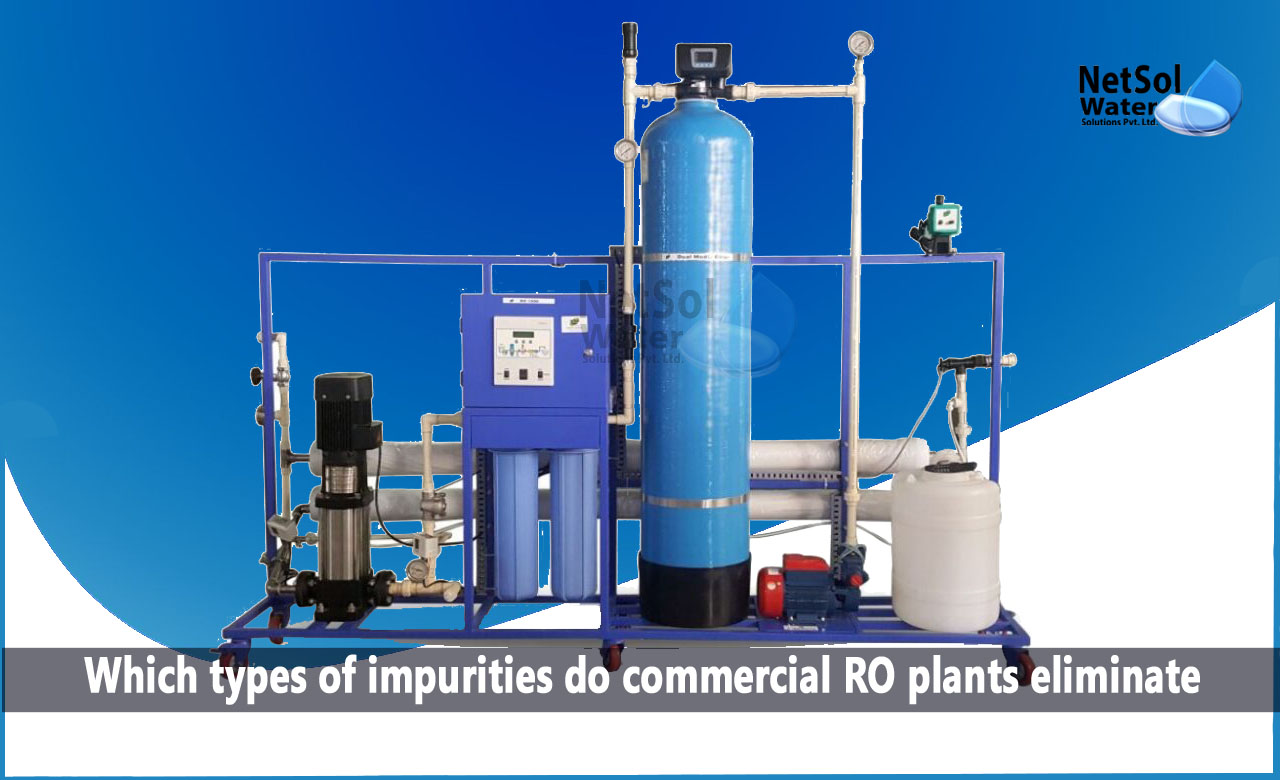Reverse Osmosis is a pressure-driven membrane technology. In real-world applications, its membrane preserves 95-99% of dissolved solutes (organic and inorganic) in the concentrate, while generating high-quality water as the permeate. This technique is therefore thought of as a concentration technique.
It offers various advantages over other concentration techniques, including the ability to preserve energy because the solvent removal process, doesn't require a phase change. This plant is more affordable than competing technologies when it comes to, concentrating diluted solutions and medium concentrations.
Additionally, RO concentrated fluids are resistant to heat degradation and fragrance component losses, unlike fluids concentrated using other techniques. With many advantages of water purification, let’s understand what is exactly removed by commercial RO Plants!
How can Commercial RO plants remove pollutants?
Water pressure is used in the reverse osmosis process to push water, through a semi-permeable membrane. Water molecules diffuse across the membrane molecule by molecule, as water is pressed against the reverse osmosis membrane surface, resulting in purer water on the other side while dissolved materials are rejected.
Which types of impurities do commercial RO plants eliminate?
The membranes prevent contaminants in water with an effective diameter, larger than 0.1 nm from passing through. They typically remove nearly all particles, the majority of organic chemicals, and more than 90% of ionic contaminants.
Reverse osmosis plants may have trouble removing non-ionic pollutants, with molecular weight under 100 Dalton. It grows with MW, and molecules with molecular weight more than 300 Dalton, such as particles, colloids, microbes, and huge physiologically active compounds, are utterly theoretically rejected.
Additionally, up to 98 percent of the following elements are reduced:
Aluminium, ammonium, bicarbonate, calcium, chloride, chromate, cyanide, ferrocyanide, iron, magnesium, mercury, manganese, phosphorus, silicate, silver, sodium, strontium, sulphate, sulphite, thiosulfate, zinc, etc.
The facility does not promise complete elimination of all contaminants. A pollutant found in the feed water during on-site water analysis, might not be detectable in the RO water.
Furthermore, different membranes in Commercial RO Plants have different rejection characteristics!
From a technological perspective, a membrane will reject any substance with a molecular weight greater than 100. Examples include the elements calcium, strontium, copper, and substances like sodium chloride. At maximal efficacy, organic material, including bacteria and viruses, is eliminated at a rate of 99.9%.
There are occasionally viruses and bacteria in the water that is produced. Chlorine hydrolyses and damages the membrane while eliminating chlorine compounds. The rate of deterioration depends on how much chlorine is present in the water.
Thus, pre-treating a RO membrane with activated carbon to remove chlorine, a water softener to limit the amount of hardness that will foul it, and sediment filtering to prevent blocking are all recommended.
Conclusion
The total rejection rate is unaffected if one or two membrane fibers rupture. Due to the fact that bacteria and viruses are living, reproducing creatures, even a little drop in quantifiable rejection, could cause an outbreak of infectious growth.
It's also important to keep in mind that your outcomes will differ, based on how well you take care of your equipment, how well it functions, and how much water is available when you start.
What do we offer?
Netsol Water is a well-known manufacturer of water and wastewater treatment facilities. We are the most demanding company in the water sector based on client feedback and quality.
We have a reputation for being the top manufacturer of commercial RO plants, industrial RO plants, sewage treatment plants, and effluent treatment plants. In addition, our USP is our round-the-clock client support.
Contact us at +91-9650608473 or enquiry@netsolwater.com and a member of our staff will be happy, to address your questions about Commercial RO Plants.



